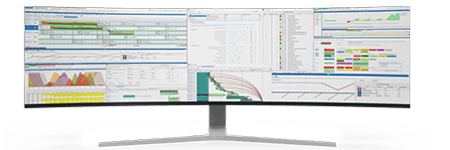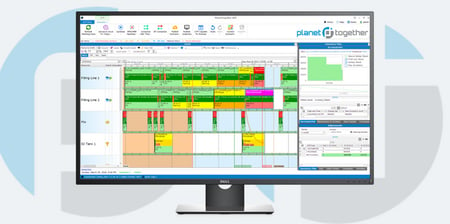
The Impact of Globalization on Supply Chain Management
Globalization has radically reshaped the landscape of supply chain management, particularly in the medical manufacturing sector. With expanded markets and interconnected supply networks, the opportunities for growth are vast. However, the challenges are equally significant—fluctuating demand, geopolitical risks, regulatory complexities, and rising transportation costs create an intricate web of considerations for Supply Chain Managers (SCMs).
In this rapidly evolving environment, integrating advanced tools like PlanetTogether with enterprise resource planning (ERP) systems such as SAP, Oracle, Microsoft, Kinaxis, or Aveva has become a game-changer. These integrations enable seamless operations across geographically dispersed facilities, enhancing visibility, agility, and decision-making.

Globalization's Impact on Medical Manufacturing
1. Expanding Markets and Complex Demand Forecasting
Globalization opens access to new markets, but it also introduces variability in demand due to regional healthcare requirements, economic conditions, and population health profiles. For example, a surge in demand for diagnostic devices in Asia may coincide with a slowdown in demand in Europe.
Without robust demand forecasting tools, supply chains can become reactive rather than proactive. Tools like PlanetTogether, when integrated with a powerful forecasting system in SAP or Kinaxis, enable advanced demand planning by pulling real-time data across global markets. This integration reduces forecasting errors and helps supply chain managers allocate resources effectively.
2. Extended Supply Chains and Increased Risk
A global supply chain often spans continents, relying on raw materials from one region, manufacturing in another, and distribution across multiple others. This extended chain is vulnerable to geopolitical instability, tariffs, and natural disasters.
PlanetTogether, integrated with Aveva’s industrial management tools, provides real-time visibility into production schedules and logistics pathways. By leveraging predictive analytics, SCMs can assess risks such as delays at ports or raw material shortages and reroute supplies proactively.
3. Compliance and Regulatory Challenges
Medical manufacturing is subject to stringent compliance standards like FDA, EMA, and ISO certifications. Global operations add a layer of complexity, as each market has unique requirements. Meeting these standards consistently across all locations requires precise coordination.
Integration of PlanetTogether with Microsoft Dynamics enables streamlined compliance tracking. By consolidating compliance data into a single dashboard, SCMs can ensure adherence to varying regulatory requirements across geographies while minimizing delays.
4. Cost Pressures and Sustainability Goals
While globalization enables cost advantages like access to cheaper raw materials, rising transportation and energy costs often offset these savings. Moreover, increasing emphasis on sustainability demands a shift toward greener operations.
PlanetTogether, when integrated with Oracle’s supply chain modules, can model and optimize transportation routes, reducing fuel consumption and carbon footprints. The combination of detailed scheduling and cost analysis ensures sustainability goals are met without compromising profitability.


How PlanetTogether Enhances Globalized Supply Chains
1. Improved End-to-End Visibility
One of the core challenges of globalization is the lack of visibility across the supply chain. PlanetTogether’s Advanced Planning and Scheduling (APS) software, when integrated with ERP systems like SAP or Oracle, provides real-time insights into production schedules, inventory levels, and logistics.
For example:
Scenario: A medical device manufacturer sources components from Asia and assembles products in Europe. Delays at the supplier level impact assembly schedules.
Solution: PlanetTogether alerts the supply chain team about the delay and offers rescheduling options using SAP’s supplier data integration, ensuring minimal disruption.
2. Enhanced Collaboration Across Stakeholders
Global operations often involve multiple stakeholders—suppliers, manufacturers, distributors, and regulatory agencies. Misalignment can lead to inefficiencies and delays. PlanetTogether’s integration with Kinaxis enables synchronized communication, allowing all parties to access updated plans and data in real-time. This eliminates silos and fosters collaboration.
3. Optimized Inventory Management
Inventory management becomes a delicate balancing act in global supply chains. Overstocking ties up capital, while understocking risks production stoppages. PlanetTogether’s APS software, when coupled with Aveva’s inventory management tools, enables dynamic inventory optimization. SCMs can monitor stock levels across regions and adjust purchase orders automatically based on demand fluctuations.
4. Data-Driven Decision Making
Globalization generates enormous amounts of data—from supplier performance metrics to transportation costs. PlanetTogether’s integration with Microsoft Power BI, within Microsoft Dynamics, turns this data into actionable insights. SCMs can analyze trends, identify bottlenecks, and make decisions that align with both short-term goals and long-term strategies.

Best Practices for Integrating PlanetTogether with ERP Systems
Align Integration Goals with Business Objectives: Define whether the focus is on cost reduction, improved visibility, or enhanced compliance.
Invest in Training: Ensure that all stakeholders understand how to use the integrated tools effectively.
Adopt Scalable Solutions: Choose integrations that can grow with your global operations, accommodating new markets or product lines.
Leverage Predictive Analytics: Use tools like Kinaxis for scenario planning to mitigate risks associated with global supply chain disruptions.
Globalization offers immense opportunities for growth in medical manufacturing, but it also comes with a unique set of challenges. By leveraging the power of integrations like PlanetTogether with enterprise resource planning (ERP) systems such as SAP, Oracle, Microsoft, Kinaxis, or Aveva, Supply Chain Managers can turn these challenges into opportunities.
Enhanced visibility, optimized inventory, and streamlined compliance processes are just the beginning. The right tools not only enable effective management of global supply chains but also pave the way for sustainable, scalable success in an increasingly interconnected world.
The future of globalized supply chains lies in technology-driven resilience--Are you ready to take your manufacturing operations to the next level? Contact us today to learn more about how PlanetTogether can help you achieve your goals and drive success in your industry.
























LEAVE A COMMENT